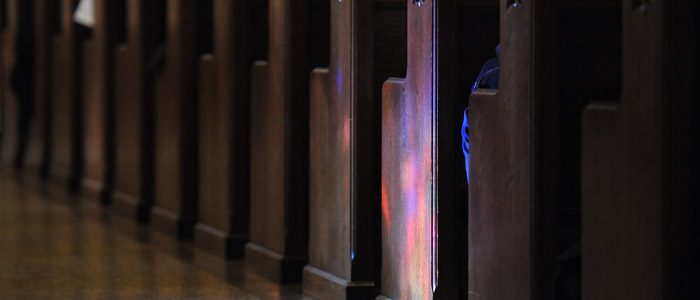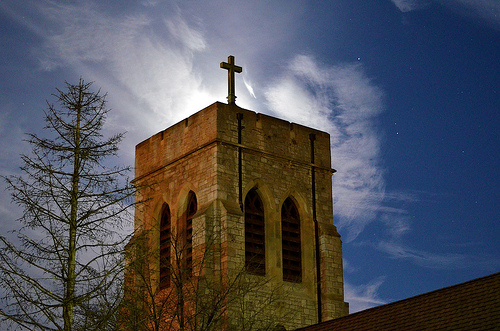Death almost always brings with it the basic question of “why.” When it is young innocents as in the Sandy Hook attack or our son Mack, it becomes even more desperate. Even when those who are older who die for no clear moral reason we are at a loss for an answer and yet need to ask the question. Why did they die? What could possibly be the divine purpose in their lives being taken? When the question is asked in this latter form it leads to some of the most offensive statements, at least offensive to this grieving father.
- God just needed him up there more than we need him down here.
- Someday we will know God’s divine plan for taking him now.
- God is using Mack’s death to ________ (fill in the gap: spread the Gospel, demonstrate his love through your grief, draw the community together, etc.)
These are all offensive to me for the same reason that have led many to throw off their belief in God entirely. They imply or state that God, with great intentionality, determined to take Mack now. This sort of belief is comforting when it happens in a positive way, “It was an amazing car crash, but somehow God’s angels protected me and saved me!” but carry that logic out and it means that God took our healthy boy because… well, there can be no reason. Because if we DO assume that God foreordains every action and reaction then God is culpable for not just the capricious taking of our son’s life, but all evil. Furthermore, this brings no comfort to this grieving man, does it comfort anyone else?
As I have said before, the only theology that I think accommodates the senseless suffering and death is the broken nature of this world. Gen. 3 is the nub and not without its own issues (see my previous posts on this elsewhere on my blog), but it shows us well enough two vital truths
- This world and we were not created to suffer this way. It was, originally, “very good.” Suffering and illness, maliciousness and harm were not part of our original condition.
- Sin entered the world and what had been perfect is now broken. Broken in a way that so often, like Mack’s illness, takes something that otherwise and in other contexts might be good and twisted becomes the source of pain and death.
So I do not believe that God “took” Mack at this time for some specific reason. He didn’t “need” him (what can God “need”?) and the manner of his death can not be construed as a punishment for the sin of his parents (he was not killed in a car crash while I was driving recklessly away from a botched bank robbery to pay for my meth habit). I do continue to believe that God is sovereign and that ultimately he will bring all things back into his order. Mack is safe with Christ and we will share with him in that eternal life.
Last Advent I wrote about the Peace of Christ and noted that this peace is not the cessation of violence that the UN seeks to negotiate. Rather, the peace that God offers us is the deep knowledge and confidence that He has conquered sin and death and that while suffering and hardship continue to reign in this world, we can trust in his love and justice. This is the peace we seek now.






19 thoughts on “The Will of God”
So heartbreaking to read of your loss, but your perspective is the right one. If I were in your shoes, I would be furious with God. And that would be ok. Blessings to you and your family–may the God of comfort give you stay in this storm.
Well said. I thank Bryan Bibb for sharing your post.
The question is: Why do parents think their child is immune to the rules that govern this life?
God doesn’t promise a long life to anyone, the Bible simply says–It is appointed unto man once to die then the judgement– No promise of a long life to anyone. Now of course, there are exceptions as God allowed John to live longer than Peter or Paul, and the latter longer than Stephen.
Children are not immune from being victims to crimes nor are they exempt from obtaining diseases, yet parents think that theirs should be and they become angry at God or question His will because their child was a victim or suffered.
Parent’s emotions tend to get in the way of their perspective as they had high hopes for their children and selfishly demand or desire a long life for their kids.
People get angry because 26 children died in the latest school shooting but they forget that over 400 were saved. People love to blame God in those situations but forget to praise Him for saving the survivors.
God can’t win because humans are never satisfied and selfishly demand more. They are never content with what they have or have had and that reflects a spiritual problem.
You should ask yourself: where is your child better off? In heaven now or alive and suffering the many situations that bring pain and suffering to him? If you say the latter then I would say you are being selfish in your thinking.
While I suspect that Dr. Brady will not, nor should he, reply to your response to his post I think that it needs a response if for no other reason than to explain for others following along that your “theology” is not as self evident as you seem to think nor is it reflective of the God that many of us pursue and are pursued by. Declarations to the contrary do not an argument make. Perhaps you have not been following closely or perhaps you simply believe that the answer to great tragedy is a simple God wills it it must be ok. Reducing this to “a God can’t win” kind of discussion misses the power of what Dr. Brady has been graciously allowing us to share with him as he grieves. To say that he is selfish demanding more and never content with what he has and therefore has a spiritual problem (And that is what you said even if you backed up and said humans generally have this problem) is not only rude, it is mistaken. The scriptures are lavish in their promises of more and better. They continually point to the ugliness of a broken world and point past it to say there is better yet to come. We are encouraged to want more and that is not selfishness it is faithfulness! (2 Corinthians 4:7-18 for one example). Jesus as he hung on the cross cried out tragically “my God, why have you abandoned me?!” He in those last moments looked and saw only darkness, he felt the utter weight of our human condition, unable to “see” or “feel” the presence of his father in the darkness of a sin broken world. This is what I hear from Dr. Brady, a cry in the darkness, an inability to see or feel what he believes to be true, that God is present and active in the world. Jesus after his declaration goes on with his dying breaths to simply declare that though the darkness hides God Jesus will still trust him as he commits his spirit into God’s unseen hands. I hear this too from Dr. Brady. Instead of dismissing this act of fatihfulness on Dr. Brady’s part as selfish we should welcome the honesty that names darkness and doubt and fear but still hopes, still trusts. I for one am grateful. Thank you Christian, you bear him well!
How can grief be selfish? Jesus wept and he knew what awaited his friend. When we grieve we grieve for ourselves, for what we lost for what we won’t experience again. That could include a laugh, a touch a energy that the person brought into the room with them. Like Job we are permitted to question and rant at God and you my friend are being selfish by trying to deny this man that.
Who said I was talking about grief? i also found his other thread title– Greatest child ever– to be insulting to all parents of the world, past, present and future plus insulting to his daughter.
Your assumptions need work and the content of a person’s words is not reliant upon how it is perceived but its intent. In other words, stop applying your meanings to my words, you have no clue.
Learn to confirm with the author before leaping to your own conclusions.
He is not the only person to lose a child nor will he be the last. That may sound cold but it is the reality and people need to stop letting their emotions influence their publications because their result may not be what they hoped for.
Theology…You’re an idiot. You are taking a painful, fresh moment of legitimate pain and using it to talk about theological talking points and to accuse and condemn a grieving person.
You show no sense of compassion or empathy.
This is not the time or place for your drivel, and if you had a single shred of human or Christian decency within you, you would overcome your own desire to be heard with the better desire to hold your tongue.
For some reason, ‘why’ is the first place we go when suffering such profound and unexplainable loss. I was glad when I dispensed with ‘why’ and got to the question “How”–how will I relate to God now with all my anger, my grief, my heartbreak? Because the how, for me, was about finding a way to be, to live, now. How will God be able to hold all that from just me, when so many others also have their own sorrows? How will God still love me when I am so angry? How and will I be able to experience or receive that love when I am such a broken vessel? As time marches on, and life goes on, how do I carry on with grief as a lifelong companion, which can be triggered and wash over me again like a tsunami at unexpected moments, like a scent, a sound, a glimpse of something. How do I live, love, and support my family when each of them has his orher own grief to bear? How do I let in the joy in when grief is there? All I can say is that answers to these questions have come minute by minute, hour by hour, day by day, over months and years. And of the many scriptures that have taken on new meaning for me in such as journey is Isaiah 40, especially verse 11, and Matthew 11:28-29, as sung in the Messiah. Let all the anger, shouting, railing against, heartbreak, resentment flow, and flow freely to the feet of our Shepherd and risen Lord.
I just wanted to let you know that your willingness to “reflect out loud” and to put words to the nature of the rugged territory you are in is…well…it’s a gift. Thank you.
Laurie – Thank you. I am glad that others find value in my reflections and musings.
I am a bit confused by theologyarchaeology’s response. Apparently I have missed the thread– Greatest child ever–somewhere. I did read one, “John William McKenzie Brady – Mack, the best boy ever”. I am not sure how that post was offensive to his daughter?
And theologyarchaeology also finds it “to be insulting to all parents of the world, past, present and future”. Theologyarchaeology must be much smarter and more important than I to be able to speak for billions of people, living, dead, and unborn!
It would also seem that theologyarchaeology is assuming and applying meaning to words of others. What was meant? That everyone in the world (if so, theologyarchaeology can check this for us with the ability to speak for them) thinks he was the best boy ever? That he was the best boy the author could ever have? The best boy the author ever knew?
I do agree with theologyarchaeology on one point:
“Your assumptions need work and the content of a person’s words is not reliant upon how it is perceived but its intent. In other words, stop applying your meanings to (others’) words, you have no clue.
Learn to confirm with the author before leaping to your own conclusions.”
I am a parent. I did not find the post offensive. Please, theologyarchaeology, do not try to speak for me again!
My guess is that theologyarchaeology doesn’t live in a glass house and waits for the cover of darkness to throw stones.
I want to thank you all for the comments. The very fact that this post has inspired such spirited discussion demonstrates the need for thinking openly about this topic.
Tim and others have responded already and more eloquently than I could have to theologyarchaeology’s comments. I would only add that, Yes, I am “selfish” (although I am not sure that is the right word, but there is certainly a selfish component to it) and would like for my children to live long and happy lives in this world, with all of its struggles and sufferings, and outlive myself and my wife. This is not a sin, this is the blessing of the incarnation. This is why we are not angels (nor do we become angels); we are mortals made for immortality, made to love God but given our own choice to do so. I would not have my child or anyone else’s deprived of this chance to love and serve God in his creation.
Chris,
It is your understanding of God in this situation that lead me to Orthodoxy from Calvinism. While my own suffering has, and I pray never, reached the depths of losing my children, when in the midst of my own suffering I was given those same platitudes I became angry. I was angry not only at the sender of the message but at the nature of God. That was the God I grew up understanding. I lost faith. God seemed to be a cruel headmaster smacking my knuckles repeatedly for not understanding what was going on – even at the raw age of 8.
When things hit bottom a few years ago the absence of God was so profound and so painful that it was nearly unbearable. Until a kind priest prayed over me and told me one simple thing, what I was experiencing was not the way things should be. That’s why the resurrection gives us hope that God suffers with us and heals us from death.
I needed healing not platitudes. I found it in the mystical supper and not in a book or a system of theological logic. It was also in a small group of people who gave me space to suffer knowing that they were there to help me slowly emerge from it as they did. The irony from these simple experiences where my heart was spiritually healed, is that a dying God became more alive in me because that turned out to be the only source of life I had left.
I want to thank you for sharing your grief publicly. I pray it has helped you to work through some of the pain. But I want you to know that each time you share both the pain and the joy of others who are contributing to Mack’s memory you are helping others, including me.